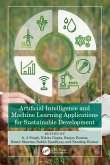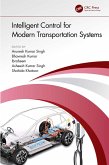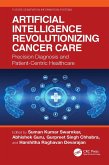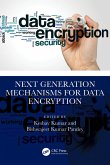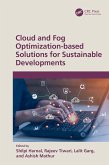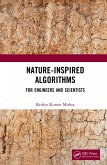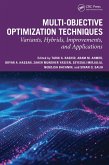Artificial Intelligence and Machine Learning Applications for Sustainable Development (eBook, ePUB)
Redaktion: Singh, A. J.; Kumar, Sandeep; Upadhyay, Subho; Sharma, Sumit; Kumar, Sanjay; Gupta, Nikita
168,95 €
168,95 €
inkl. MwSt.
Sofort per Download lieferbar

84 °P sammeln
168,95 €
Als Download kaufen

168,95 €
inkl. MwSt.
Sofort per Download lieferbar

84 °P sammeln
Jetzt verschenken
Alle Infos zum eBook verschenken
168,95 €
inkl. MwSt.
Sofort per Download lieferbar
Alle Infos zum eBook verschenken

84 °P sammeln
Artificial Intelligence and Machine Learning Applications for Sustainable Development (eBook, ePUB)
Redaktion: Singh, A. J.; Kumar, Sandeep; Upadhyay, Subho; Sharma, Sumit; Kumar, Sanjay; Gupta, Nikita
- Format: ePub
- Merkliste
- Auf die Merkliste
- Bewerten Bewerten
- Teilen
- Produkt teilen
- Produkterinnerung
- Produkterinnerung

Bitte loggen Sie sich zunächst in Ihr Kundenkonto ein oder registrieren Sie sich bei
bücher.de, um das eBook-Abo tolino select nutzen zu können.
Hier können Sie sich einloggen
Hier können Sie sich einloggen
Sie sind bereits eingeloggt. Klicken Sie auf 2. tolino select Abo, um fortzufahren.

Bitte loggen Sie sich zunächst in Ihr Kundenkonto ein oder registrieren Sie sich bei bücher.de, um das eBook-Abo tolino select nutzen zu können.
The book highlights how technologies including artificial intelligence and machine learning are transforming renewable energy technologies and enabling the development of new solutions.
- Geräte: eReader
- mit Kopierschutz
- eBook Hilfe
Andere Kunden interessierten sich auch für
![Artificial Intelligence and Machine Learning Applications for Sustainable Development (eBook, PDF) Artificial Intelligence and Machine Learning Applications for Sustainable Development (eBook, PDF)]() Artificial Intelligence and Machine Learning Applications for Sustainable Development (eBook, PDF)168,95 €
Artificial Intelligence and Machine Learning Applications for Sustainable Development (eBook, PDF)168,95 €![Intelligent Control for Modern Transportation Systems (eBook, ePUB) Intelligent Control for Modern Transportation Systems (eBook, ePUB)]() Intelligent Control for Modern Transportation Systems (eBook, ePUB)52,95 €
Intelligent Control for Modern Transportation Systems (eBook, ePUB)52,95 €![Artificial Intelligence Revolutionizing Cancer Care (eBook, ePUB) Artificial Intelligence Revolutionizing Cancer Care (eBook, ePUB)]() Artificial Intelligence Revolutionizing Cancer Care (eBook, ePUB)52,95 €
Artificial Intelligence Revolutionizing Cancer Care (eBook, ePUB)52,95 €![Next Generation Mechanisms for Data Encryption (eBook, ePUB) Next Generation Mechanisms for Data Encryption (eBook, ePUB)]() Next Generation Mechanisms for Data Encryption (eBook, ePUB)52,95 €
Next Generation Mechanisms for Data Encryption (eBook, ePUB)52,95 €![Cloud and Fog Optimization-based Solutions for Sustainable Developments (eBook, ePUB) Cloud and Fog Optimization-based Solutions for Sustainable Developments (eBook, ePUB)]() Cloud and Fog Optimization-based Solutions for Sustainable Developments (eBook, ePUB)54,95 €
Cloud and Fog Optimization-based Solutions for Sustainable Developments (eBook, ePUB)54,95 €![Nature-Inspired Algorithms (eBook, ePUB) Nature-Inspired Algorithms (eBook, ePUB)]() Krishn Kumar MishraNature-Inspired Algorithms (eBook, ePUB)48,95 €
Krishn Kumar MishraNature-Inspired Algorithms (eBook, ePUB)48,95 €![Multi-objective Optimization Techniques (eBook, ePUB) Multi-objective Optimization Techniques (eBook, ePUB)]() Multi-objective Optimization Techniques (eBook, ePUB)115,95 €
Multi-objective Optimization Techniques (eBook, ePUB)115,95 €-
-
-
The book highlights how technologies including artificial intelligence and machine learning are transforming renewable energy technologies and enabling the development of new solutions.
Dieser Download kann aus rechtlichen Gründen nur mit Rechnungsadresse in A, B, BG, CY, CZ, D, DK, EW, E, FIN, F, GR, HR, H, IRL, I, LT, L, LR, M, NL, PL, P, R, S, SLO, SK ausgeliefert werden.
Produktdetails
- Produktdetails
- Verlag: Taylor & Francis eBooks
- Erscheinungstermin: 28. Januar 2025
- Englisch
- ISBN-13: 9781040273593
- Artikelnr.: 72646636
- Verlag: Taylor & Francis eBooks
- Erscheinungstermin: 28. Januar 2025
- Englisch
- ISBN-13: 9781040273593
- Artikelnr.: 72646636
- Herstellerkennzeichnung Die Herstellerinformationen sind derzeit nicht verfügbar.
A J Singh is a Professor in Department of Computer Science in HPU. He has been in this department since 1992. He obtained Bachelor of Engineering in Computer Technology from NIT Bhopal, Master of Science in Distribute Information Systems from University of East London, UK under British Government ODASS Scholarship and Ph.D. degree Himachal Pradesh University, Shimla. He worked on deputation to Royal Government of Bhutan under Colombo Plan for three years. He has published more than 50 research papers, supervised six Ph.D. dissertations, 9 students are doing PhD under his supervision. Nikita Gupta received a B. Tech degree in Electrical and Electronics Engineering from National Institute of Technology, Hamirpur, India in 2011 and M. Tech degree in Power System from Delhi Technological University, Delhi, India in 2014. She has completed her PhD degree in the Department of Electrical Engineering from Delhi Technological University, Delhi, India in December 2018. Presently, she is working as Assistant Professor at the University Institute of Technology, Himachal Pradesh University, Shimla (H.P), India. Her research interests include power system engineering, renewable energy systems, power quality, soft computing techniques, and microgrids. Dr. Nikita has published numerous research papers in reputed international including IEEE and IET, 2 book chapters, and 22 research papers in international and national conferences. Additionally, she has also published 3 edited books in reputed publications and two authored books for B. Tech machines courses. She has received funding from HIMCOSTE for a project on wind turbines. She is also an active reviewer of journals including IEEE Transactions on Power Electronics, IET Power Electronics, Journal of Engineering, IEEE Access, Wiley Journal of Energy, and many more. Dr. Nikita received the 'Commendable Research Award' for excellence in research in the year 2018 at Delhi Technological University, Delhi, India. She is the recipient of the outstanding paper award from the IEEE-GPECOM, in 2020. She is the recipient of the best paper award from the IEEE-INDICON, in 2015. She is a member of various technical communities including member IEEE, member IAENG, member ISRD and Lifetime Member TERA. Sanjay Sharma received a B. Tech degree in Electrical Engineering from Himachal Pradesh University, Shimla, India in 2007 and M. Tech degree in Power System from National Institute of Technology, Hamirpur, India in 2010. He has completed her Ph.D. degree in Department of Electrical Engineering from Punjab Engineering College Deemed to be University Chandigarh, India in December 2019. Presently, he is working as Assistant Professor in University Institute of Technology, Himachal Pradesh University, Shimla (H.P), India. He worked on a Project "Development and validation of technology for production of high energy density from rice straw and Agri- biomasses (Funding agency PSA, GOI and Sweden). He published many research papers in reputed international and national journals. His area of research includes Power System, Renewable Energy, Network Planning, Micro grid, Optimization, GIS and Machine Learning. He has published a number of research papers in various journals, conferences. Presently his one book on Renewable Energy has been published in a reputed journal. He also granted with one patent and one in progress. He has 6 years teaching experience of NITs and government institute. He is reviewer of various conferences and international journals. Sumit Sharma received a B.Tech in Electrical Engineering from Maharishi Markandeshwar University Mullana, Haryana, India in 2013 and M.Tech in Electrical Engineering (Power System) from PEC University of Technology Chandigarh, India in 2017. He has completed his Ph.D in Electrical Engineering from National Institute of Technology Hamirpur, India in 2022. Presently he is working as an Assistant Professor at KIET Group of Institutions, Ghaziabad. His research interest includes microgrid in rural environment, renewable energy sources, power system deregulation etc. He is the active reviewer of various international journals and conferences including international publications. Subho Upadhyay received his ME degree in Electrical and Electronics Engineering from Birla Institute of Technology, Mesra, India in 2012 and Ph.D. from Indian Institute of Technology, Roorkee, India in August 2017. He is currently working as an Assistant Professor in Electrical Engineering Department at Dayalbagh Educational Institute, Agra. Dr. Subho teaches Power Electronics, Electrical Machine, Electrical Measurements and Fuzzy Systems in his institute. His research interests include integrated renewable energy system, power electronics applications in renewable energy, soft computing techniques and optimization. Renewable Energy System Modeling, Optimization and Applications is a book edited by him which is published by Scrivener publication and Wiley in 2022. He is an active reviewer of a number of various international journals and conferences. He is also working as an NSS Program Officer in his institute. Sandeep Kumar holds the position of Professor in the Department of Computer Science and Artificial Intelligence at SR University, Warangal, Telangana, India, an institution with an A+ NAAC accredited. He completed his Post Doc from Pentagram Pvt. Ltd. in August 2021. He has good Academics & Research experience in various areas of Electronics and Communication. His area of research includes Embedded System, Image Processing, Biometrics and Machine Learning. He has granted 25 Patents (17-National & 8-International) and 7 patents filed successfully (6-National & 1-International patent). He has been received 20 times invitations to be a Guest in Scopus Indexed IEEE/Springer Conferences. He has been invited 12 times to be an expert in various Colleges/universities in India. He has published 150 research papers in various International/National Journals (including IEEE, Springer, etc.) and Proceedings of the reputed International/ National Conferences (including Springer and IEEE). He has been awarded "Best Paper Presentation" in Nepal & India, respectively, 2017 & 2018. He was awarded for "Best Performer Award" in Hyderabad, India, in 2018. He has also been awarded the "Young Researcher Award" in Thailand, 2018. He has also been awarded the "Best Excellence Award" in Delhi, 2019. He has also been awarded the "Excellence in Academics Award" in Chennai, 2020. He is an active member of 22 various Professional International Societies. He has been nominated on the board of editors/reviewers of 25 peer-reviewed and refereed Journals. He has conducted 3 International Conference and 6 Workshops. He has also attended 45 seminars, workshops and short-term courses in IITs, etc. He has supervised 23 M. Tech & 2 PhD Scholars and currently has been Supervising 04 PhD Scholars & 2 M.Tech Scholars. His Fourteen books have been published at the International level and two books are in the press for publications at the International level.
1. Comprehensive Framework and Classification of Advanced Artificial
Intelligence and Machine Learning Modelling Techniques. 2. Sustainable
Development Using Renewable Energy Sources: Artificial Intelligence &
Machine Learning contribution. 3. Artificial Intelligence as a tool for
building more resilient cities in the climate change era: A systematic
literature review. 4. Achieving Sustainable Development Goals through
Knowledge Management in Industry 4.0: A Critical Review from the
Perspective of Bangladesh. 5. Harmonizing Innovation and Accountability:
The Intersection of Artificial Intelligence and Machine Learning in
Sustainable Development. 6. A New Innovative Methodology for Photovoltaic
Integration on Rooftops for Cost Reduction and Reduced Grid Dependency. 7.
A Residual Deep Neural Network Based Non-Invasive system for Tomato Crop
Health Monitoring, Disease Type Identification and Remedial Measures. 8.
Advancements in Healthcare: Machine Learning Applications for quick Disease
Diagnostics and Individualized Treatment. 9. IoT Based Home Automation
using NODEMCU. 10. Stabilization and Synchronization of Chen-Lee Chaotic
System using Sliding Mode Control Approach. 11. Application of Machine
Learning Models for Power Systems Security Assessment. 12. Machine learning
and deep learning models for effective forecasting of renewable energy
generation. 13. Unlocking Predictive Potential: An Innovative Approach for
Accuracy Enhancement in Software Effort Estimation. 14. Deep Learning-based
Approach to Predict Software Faults
Intelligence and Machine Learning Modelling Techniques. 2. Sustainable
Development Using Renewable Energy Sources: Artificial Intelligence &
Machine Learning contribution. 3. Artificial Intelligence as a tool for
building more resilient cities in the climate change era: A systematic
literature review. 4. Achieving Sustainable Development Goals through
Knowledge Management in Industry 4.0: A Critical Review from the
Perspective of Bangladesh. 5. Harmonizing Innovation and Accountability:
The Intersection of Artificial Intelligence and Machine Learning in
Sustainable Development. 6. A New Innovative Methodology for Photovoltaic
Integration on Rooftops for Cost Reduction and Reduced Grid Dependency. 7.
A Residual Deep Neural Network Based Non-Invasive system for Tomato Crop
Health Monitoring, Disease Type Identification and Remedial Measures. 8.
Advancements in Healthcare: Machine Learning Applications for quick Disease
Diagnostics and Individualized Treatment. 9. IoT Based Home Automation
using NODEMCU. 10. Stabilization and Synchronization of Chen-Lee Chaotic
System using Sliding Mode Control Approach. 11. Application of Machine
Learning Models for Power Systems Security Assessment. 12. Machine learning
and deep learning models for effective forecasting of renewable energy
generation. 13. Unlocking Predictive Potential: An Innovative Approach for
Accuracy Enhancement in Software Effort Estimation. 14. Deep Learning-based
Approach to Predict Software Faults
1. Comprehensive Framework and Classification of Advanced Artificial
Intelligence and Machine Learning Modelling Techniques. 2. Sustainable
Development Using Renewable Energy Sources: Artificial Intelligence &
Machine Learning contribution. 3. Artificial Intelligence as a tool for
building more resilient cities in the climate change era: A systematic
literature review. 4. Achieving Sustainable Development Goals through
Knowledge Management in Industry 4.0: A Critical Review from the
Perspective of Bangladesh. 5. Harmonizing Innovation and Accountability:
The Intersection of Artificial Intelligence and Machine Learning in
Sustainable Development. 6. A New Innovative Methodology for Photovoltaic
Integration on Rooftops for Cost Reduction and Reduced Grid Dependency. 7.
A Residual Deep Neural Network Based Non-Invasive system for Tomato Crop
Health Monitoring, Disease Type Identification and Remedial Measures. 8.
Advancements in Healthcare: Machine Learning Applications for quick Disease
Diagnostics and Individualized Treatment. 9. IoT Based Home Automation
using NODEMCU. 10. Stabilization and Synchronization of Chen-Lee Chaotic
System using Sliding Mode Control Approach. 11. Application of Machine
Learning Models for Power Systems Security Assessment. 12. Machine learning
and deep learning models for effective forecasting of renewable energy
generation. 13. Unlocking Predictive Potential: An Innovative Approach for
Accuracy Enhancement in Software Effort Estimation. 14. Deep Learning-based
Approach to Predict Software Faults
Intelligence and Machine Learning Modelling Techniques. 2. Sustainable
Development Using Renewable Energy Sources: Artificial Intelligence &
Machine Learning contribution. 3. Artificial Intelligence as a tool for
building more resilient cities in the climate change era: A systematic
literature review. 4. Achieving Sustainable Development Goals through
Knowledge Management in Industry 4.0: A Critical Review from the
Perspective of Bangladesh. 5. Harmonizing Innovation and Accountability:
The Intersection of Artificial Intelligence and Machine Learning in
Sustainable Development. 6. A New Innovative Methodology for Photovoltaic
Integration on Rooftops for Cost Reduction and Reduced Grid Dependency. 7.
A Residual Deep Neural Network Based Non-Invasive system for Tomato Crop
Health Monitoring, Disease Type Identification and Remedial Measures. 8.
Advancements in Healthcare: Machine Learning Applications for quick Disease
Diagnostics and Individualized Treatment. 9. IoT Based Home Automation
using NODEMCU. 10. Stabilization and Synchronization of Chen-Lee Chaotic
System using Sliding Mode Control Approach. 11. Application of Machine
Learning Models for Power Systems Security Assessment. 12. Machine learning
and deep learning models for effective forecasting of renewable energy
generation. 13. Unlocking Predictive Potential: An Innovative Approach for
Accuracy Enhancement in Software Effort Estimation. 14. Deep Learning-based
Approach to Predict Software Faults

